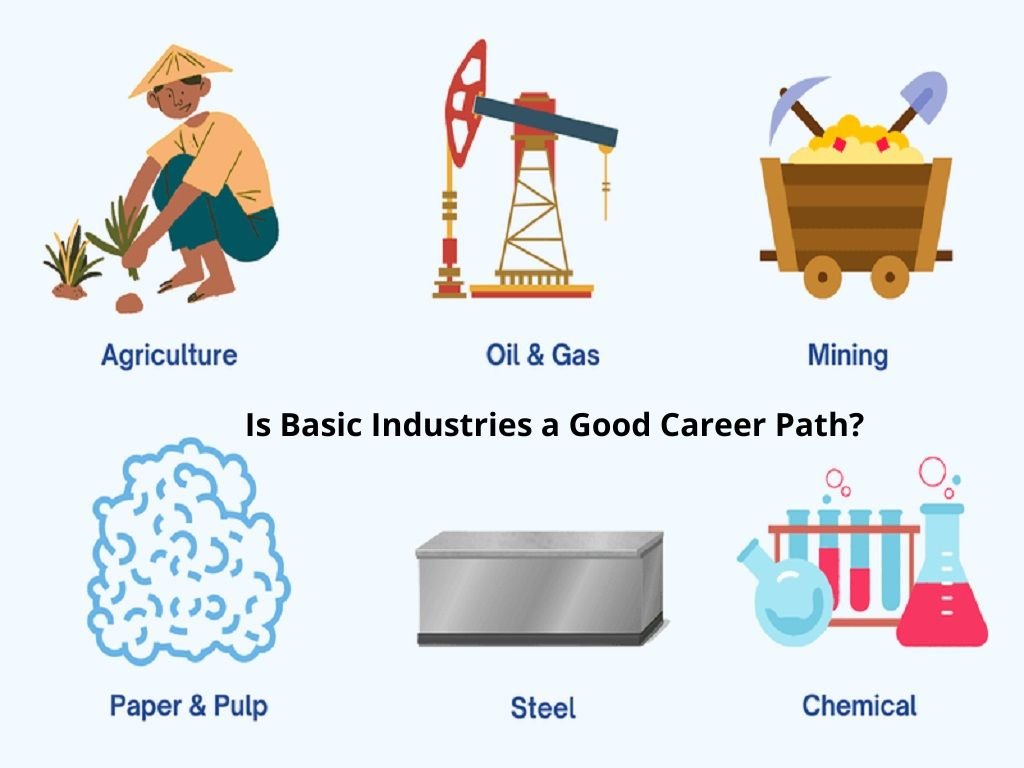How Many Jobs Are Available In Basic Industries?

How many jobs are available in basic industries? There are quite a few job opportunities in these industries, but first, you need to get examples of such industries. They include agriculture, energy and mining, construction, transportation and utilities, manufacturing, wholesale trade, retail trade, and information services.
The Bureau of Labor Statistics (BLS) refers to these industries as production, which accounts for nearly 30 percent of U.S. employment. While some people may not realize it, these industries are vital to our economy.
They provide jobs for millions of Americans and contribute billions of dollars in revenue each year to local economies. It’s important to note that BLS does not track industry-specific job growth; however, there are several websites dedicated to industry statistics.
Table of Contents
What are Basic Industries?
Basic industries are those that provide raw materials to other industries to manufacture goods. Further, these industries execute the discovery, development, and processing of raw materials.
Examples of basic industries are iron and steel, metallurgical, wood, paper, milling, and chemicals. Furthermore, industries related to mining non-metallic minerals such as granite and marble also fall under this umbrella.
What Companies Are in the Basic Industries Field?
If you are considering a new career, or if you’re trying to decide on a major in college, you may have come across the term “basic industries”. Basic industries are simply the industries that supply raw materials to other fields of manufacturing and production.
Is basic industries a good career path? If you’ve noticed that there are several different types of work that can be considered “basic”, you’re correct. This term does not refer to one industry (or even one type of industry, such as metallurgy); instead, it refers to industries that create and manufacture products that are meant to be distributed outside of the local economy.
In contrast, non-basic industries’ products and services are used locally. Basic industries may include the following types of companies:
- Agriculture such as wheat, soy, and corn production
- Fruit orchards and vegetable farms
- Raw materials such as iron and steel
- Forestry, logging, and mining
- Oil and Gas Industry
- Mining Industry
- Paper and Pulp Industry
- Steel Industry
- Chemical Industry
- Rudolph and Sletten
- DuPont de Nemours
- Masco Corporation
- Sealed Air Corporation
- Newmont Mining Corporation
- Procter & Gamble Company
- Cargill
Is Basic Industries a Good Career Path?

The above job descriptions are but a few of the career paths available within the basic industry. While many positions in the basic industries are not considered to be lucrative according to national standards. They can provide job security and stability.
The Bureau of Labor Statistics expects that jobs in the basic industries will grow by 2.7% over the next 10 years. This industry is not expecting a boom in growth, but it is increasing at a steady and predictable rate.
This makes it an excellent career choice for those who wish to work with the materials and products that support the fabric of our daily lives.
How Many Jobs Are Available In Basic Industries?
Manufacturing, wholesaling, and retailing are all examples of basic businesses that offer various job options. Basic industries are now more in demand as a means of employment due to increased demand for trained people.
Although this industry is growing steadily and predictably. It is not anticipating a surge in growth. It’s an excellent career choice for those who want to work with the materials and goods that form the foundation of our daily life. The best aspect is that interested individuals have a boatload of choices.
What are the Career Options in Basic Industries?
The growing list of industries and careers associated with basic industries can seem overwhelming. However, if you have an interest in manufacturing, energy, or agriculture. There are a lot of jobs available to those who train for them.
This post will break down some of these options so you can see what career paths might be right for you. If you’re looking for information on one specific industry, click on one of these links: Agriculture Manufacturing Energy. For example, farmers earn around $74,000 per year while wind turbine technicians earn around $64,000 per year.
1. Agricultural Scientist
The average Salary is around $80,000 annually. Agricultural scientists study soil and plant growth as well as animal husbandry. These professionals provide solutions for issues. That could affect food supply across a region or even a country such as disease outbreaks and environmental changes.
2. Animal Scientist
Average Salary – $71,000 Animal scientists work with livestock such as cattle to ensure animals receive proper nutrition and medical care to increase their productivity which is used to benefit both animal health and farmer income levels.
3. Environmental Scientist
Average Salary – $75,000 Environmental scientists are responsible for studying an area’s natural resources and making recommendations on how they can be preserved while still allowing humans to use them.
4. Food Technologist
The average Salary is around $62,000 annually. Food technologists develop ways to process raw ingredients into safe foods by testing products for quality control and safety standards.
5. Biomedical Engineer
Average Salary – $77,000 Biomedical engineers develop new devices and techniques that allow doctors to more accurately diagnose diseases or treat injuries through more effective equipment design.
6. Chemical Engineer
Average Salary – $87,000 Chemical engineers apply scientific principles to create new substances or improve existing ones for use in manufacturing processes.
7. Civil Engineer
Average Salary – $78,000 Civil engineers plan and supervise construction projects from start to finish including roads, bridges, and buildings.
8. Electrical/Electronics Technician
Average Salary – $59,000 Electrical/electronics technicians install wiring systems and other electrical components of machines and appliances according to manufacturers’ specifications.
9. Industrial Designer
The average Salary is around $70,000 annually. Industrial designers create concepts for manufactured goods based on consumer preferences and need and then use computer-assisted design software to help turn those ideas into reality.
10. Mechanical Engineer
Average Salary – $83,000 Mechanical engineers create machinery and mechanical tools using applied science principles.
11. Tooling Designers
Average Salary – $65,000 Tooling designers use computer programs to make sure machinery parts fit together correctly before mass production begins.
12. Welders & Cutters
Average Salary – $45,000 Welders cut metal pieces together using a welding gun that melts two pieces of metal together at high temperatures.
13. Machinists & Machine Operators

Average Salary – $43,000 Machinists operate machinery designed to shape materials like metal or plastic according to specified dimensions while machine operators run machines designed for repetitive tasks like packaging or labeling items
14. Automotive Service Technicians & Mechanics
Average Salary – $37,000 Automotive service technicians repair cars and trucks while mechanics specialize in specific areas of auto repair such as brakes or engines
15. Construction Laborers
Average Salary – $30,000 Construction laborers assist contractors with building projects ranging from residential homes to large commercial buildings
16. Construction Equipment Operators
Average Salary – $35,000 Construction equipment operators drive vehicles that move earth during excavation activities
17. Crane Operators
Average Salary – $44,000 Crane operators lift heavy objects using cranes that hoist loads up to 300 tons
18. Electricians
The average Salary is around $51,000 annually. Electricians install wiring systems and other electrical components of machines and appliances according to manufacturers’ specifications
19. Glaziers
Average Salary – $38,000 Glaziers install glass in windows and skylights
20. Heavy Construction Equipment Operators
Average Salary – $42,000 Heavy construction equipment operators drive vehicles that move earth during excavation activities
21. Operating Engineers & Other Construction Equipment Operators
Average Salary – $48,000 Operating engineers and other construction equipment operators drive machines that dig or build structures such as highways or tunnels
22. Paving, Surfacing & Tamping Equipment Operators
Average Salary – $47,000 Paving, surfacing, and tamping equipment operators use machinery to create a smooth surface for paved roads
23. Roofers
The average Salary is around $38,000 annually. Roofers install and troubleshoot issues with roof shingles or panels. If you’re interested in these careers, keep reading to learn more about what jobs are available. If you’re looking for something else, check out our list of other career options.
Education in Basic Industries
Basic industry careers often require a degree in engineering or technical fields. However, there are many jobs that do not require a degree and are open to those without one. Education is important to research the specific industry you are interested in before applying for a job.
The Bureau of Labor Statistics (BLS) projects that the basic industries sector will grow by about 5 percent between 2016 and 2026, which should provide plenty of opportunities for those looking to enter the field.
With high-paying jobs available with minimal education requirements across multiple fields, now is a great time to get started. Keep your eyes open for job postings, and be prepared to interview for positions.
What Should You Expect While Working For Basic Industries?
Learning how to work for basic industries involves more than just putting on a uniform and showing up. You should expect that as a career change, it will take some time to get used to your new job duties.
If you’re moving from working in an office setting, you’ll need time to adjust to being exposed to manual labor on a daily basis. Additionally, you’ll need patience as you develop communication skills that work well with people outside of your office setting.
Also, be prepared for regular working hours and some overtime if necessary. Finally, remember that all employees are expected to maintain a professional appearance at all times. This means no blue jeans or shorts at work!
Where Are the Best Places to Work (Salary)?
If you’re wondering where jobs in basic industries are located and what types of salaries you can expect. Then you’ve come to the right place. We’ll give you a breakdown of some of your best options for employment as well as insight into what jobs require higher education and which don’t.
Keep reading to learn about how many jobs there are available in basic industries, from agricultural workers to construction managers, and how much they pay—along with insights into whether they require higher education or not. Are you ready? Let’s get started!
6 Ways to Land a Job in The Basic Industries Sector?
The Basic Industries Sector includes a wide range of businesses that produce goods used in other industries or in daily life. Because of this, there are many opportunities for employment in the sector.
Here are a few tips for landing a job in the Basic Industries Sector:
- Identify the businesses in the sector that align with your skills and experience.
- Research these businesses to learn about their products, services, and hiring needs.
- Tailor your resume and cover letter to each specific business.
- Reach out to your professional network to see if anyone has connections to the businesses you’re interested in.
- Apply for open positions through the company’s website or other online job portals.
- Finally, don’t forget to follow up after submitting your application! A little extra effort can go a long way towards landing the job you want.
The Final Word
The fundamental industries offer raw materials to the other manufacturing and production disciplines. Raw materials such as iron and steel are examples. However, when it comes to employment prospects, today’s youth are usually faced with difficult choices. They are undecided about which career route is ideal for them.
Many people today question if entire industries are realistic career options. This is due to the fact that such positions are rarely discussed in their particular circles. Basic industries are those that supply raw materials to other businesses. Their jobs are very different, but they both provide a lot of satisfaction.
Frequently Asked Questions (FAQs) about How Many Jobs Are Available in Basic Industries?
What is the world’s largest industry?
The financial industry is currently one of the most important industries, but as the technology sector grows, it appears that it will eventually take over the financial market as well. Yes, the biggest industry in the world is the finance industry! With a value of $109 trillion, it dwarfs its competitors. Real estate, for example, is worth $33 trillion, whereas retail is about $26 trillion.
How many are the basic industries?
Under this classification, there are two different types of industries: Mineral-based industries – Examples of mineral-based industries are petrochemicals, machine tools, aluminum, cement, iron, and steel.
What’s a basic industry?
basic industry. noun [ C ] PRODUCTION, ECONOMICS. a type of industry that produces materials that are supplied to other industries, and which is important in a country’s economy: basic industries such as mining, oil, and gas.
What are basic industries and why are they important?
A basic industry is an industry that focuses on the production of products and services for export, rather than for domestic sales and circulation. Are basic industry is an industry that focuses on the production of products and services for export, rather than for domestic sales and circulation.
What are basic and nonbasic jobs?
Basic industries are those which depend on income from outside the region, thus bringing money into the region. Non-basic industries are those which generally sell to residents or businesses already in the region.
Is basic industries a good career path?
For as long as goods need to be manufactured or assembled, there will be job opportunities in the basic industries market. These jobs will always be important in the economy and offer excellent opportunities for those who are production-minded.
Read Also:
Why Should Hire Best Tree Service Company
How to Revise Your Trading Strategy Like a Pro Trader
How much Does Pete Nelson make Per Episode?
Is Packaged Foods a Good Career Path?
How Many Receipts Did Fetch Rewards Shoppers Snap in February?





